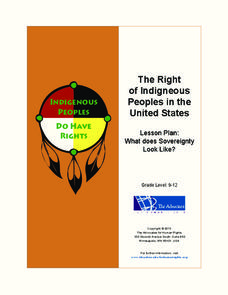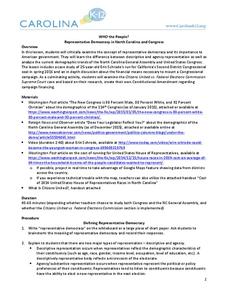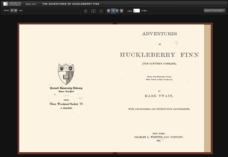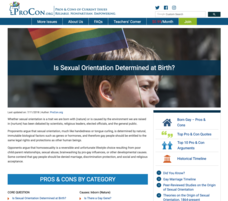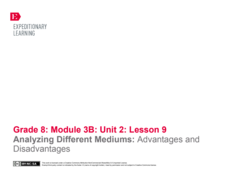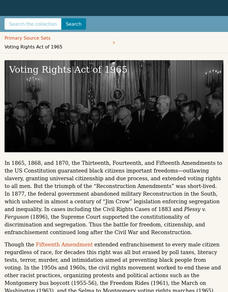Advocates for Human Rights
The Right of Indigneous Peoples in the United States
The sovereignty of U.S. Native American nations is the focus of a resource that asks class members to compare the Right to Self-Determination in the UN Declaration on the Rights of Indigenous Peoples with a fact sheet that details the...
Carolina K-12
Who the People? Representative Democracy in North Carolina and Congress
Our elected officials are supposed to represent us, but what does it mean when they aren't like us? Budding citizens explore the demographic makeup of the US Congress, the role of money in political elections, and the Citizens United...
Advocates for Human Rights
The Rights of Women in the United States
Six diverse activities make up a substantial unit on the women's rights movement in the United States, past and present. A few of the topics at hand: the fourteenth and nineteenth amendments, the Equal Pay Act, the Lily Ledbetter Act,...
Roy Rosenzweig Center for History and New Media
Immigration: Why Come to the United States?
Don't limit your curriculum to texts! Young historians listen to a song, read an interview, and examine a cartoon as they explore motivations for immigrating to the US in the late 19th and early 20th centuries.
Administrative Office of the US Courts
Snyder v. Phelps
Does the Westboro Baptist Church have the protection of the Constitution when protesting military funerals? High schoolers examine the 2011 Supreme Court case of Snyder v. Phelps before comparing the situation to a fictional scenario of...
Give and Let Live
Blood and Transplant: Bone Marrow
What causes someone to need a bone marrow transplant? Fascinate your class with a activity on the intricate task of procuring bone marrow for patients suffering from illnesses like leukemia. The fourth and final installment in a series...
Fluence Learning
Writing an Argument: Free Speech
How do you assess whether pupils have mastered certain concepts and skills? Designing a performance task that asks learners to demonstrate their skills and providing writers with a rubric that identifies these skills and provides...
Prestwick House
Poe’s “The Raven” – Unity of Effect
How do Poe's choices of imagery, rhythm and rhyme scheme, and structure help build the desired single effect of "The Raven"? After listening to a dramatic reading of the poem, class members consider whether Poe's choices do create a...
Read Works
Columbus Reports on His First Voyage, 1493
What did Christopher Columbus have to say about his exploration of the Caribbean? Young historians have a chance to examine Columbus' own words about his voyage to Cuba and Santo Domingo. After reading Columbus' report, pupils respond to...
American Psychological Association
Sexual Orientation and Youth
A 24-page manual provides principals, educators, and other school personnel with factual information about sexual orientation development, important legal principles they must consider, and problematic efforts to change sexual...
Library of Congress
The Adventures of Huckleberry Finn
The Adventures of Huckleberry Finn is one of the best-known pieces of American literature. An eBook from the Library of Congress provides access to an early edition of the text. Original layout and illustrations are preserved within.
Carolina K-12
Political Parties and Conventions
The two major parties polarize many in America today, but it doesn't have to be that way in the classroom! Teach learners about political party platforms and modern campaigns with a mock political convention. After watching a PowerPoint...
Teaching for Change
A Documents-Based Lesson on the Voting Rights Act
How did the Voting Rights Act affect the daily lives of American citizens? A document-based lesson developed by the Student Non-Violent Coordinating committee (SNCC) presents a case study of the impact of the Voting Rights Act of 1965 on...
Curated OER
Born Gay
Is a person's sexual orientation determined at birth? With the informative website, scholars prepare for a debate about the topic. They learn the top pro and con arguments and read through a historical timeline of homosexuality. They...
National WWII Museum
The War in Europe: Evaluating Historic Decisions
War brings a whole new set of ethical dilemmas. From deciding whether to enlist in a segregated and racist Army to whether to sacrifice civilian lives to prepare for a critical D-Day invasion, leaders during World War II faced many...
EngageNY
Analyzing Different Mediums: Advantages and Disadvantages
How do authors play to people's moods? After briefly reviewing mood using a Conditional and Subjunctive Mood handout, learners practice identifying conditional and subjunctive sentences in the Montgomery Bus Boycott speech before reading...
Digital Public Library of America
Voting Rights Act of 1965
Despite the passing of the Thirteenth, Fourteenth, and Fifteenth Amendments, as well as the passing of the Voting Rights Act of 1965, the struggle to ensure fair voter registration and election procedures continues. Young historians...
Simon & Schuster
Curriculum Guide to: Adventures of Huckleberry Finn by Mark Twain
Five lessons make up a curriculum guide to The Adventures of Huckleberry Finn. Readers find examples of Twain's use of irony, closely examine Huck's colloquial language, as well as his sense of morality, and identify themes in the novel....
American Institute of Physics
African Americans and Life in a Secret City
Imagine the lure of being offered a job at a secret site, working on a secret project, and earning higher wages! Such was the approach used to recruit African Americans to Hanford, Washington, one of several sites used to develop...
Smithsonian Institution
The Suffragist: Educator's Guide for Classroom Video
Class members take on the role of historical investigators to determine why it took 40 years for women in the United States to get the right to vote. Sleuths view videos and analyze primary sources and images to gather evidence to answer...
K20 LEARN
Power to the People
Black berets, black leather jackets, raised black fists, chants of "Power to the People!" These are the images that many associate with the Black Panther Party. Often forgotten are the programs the party created during the Civil Rights...
Anti-Defamation League
Hair Discrimination and the CROWN Act
The CROWN Act (Creating a Respectful and Open World for Natural Hair) is the subject of the lesson that asks groups to research the stories of five different women and share their insights in a jigsaw activity. Participants then craft...
K20 LEARN
The New Colossus: Determining Author's Perspective
Introduce young scholars to the concept of the author's perspective with a lesson that uses Emma Lazarus's poem, "The New Colossus," as the anchor text. Groups use a T-chart to identify words that reveal the author's point of view of The...
Curated OER
A Dark Cloud Over the Sunshine State
Students provide their own solutions to the controversy over the ballots in Florida.
Other popular searches
- Controversial Medical Issues
- Controversial Statements
- Controversial Science
- Controversial Issues
- Controversial Art Exhibit
- Controversial Events
- Controversial Films
- Controversial Hero
- Controversial Topics
- Current Controversial Issues
- Controversial Science Issues
- Controversial Issues Paper


